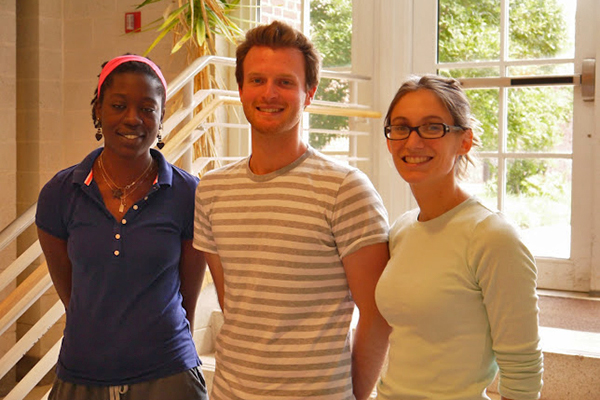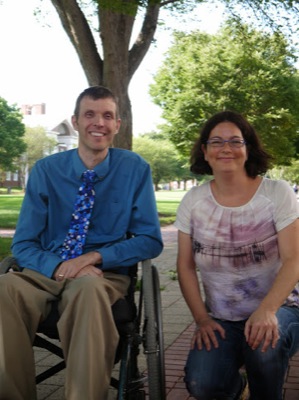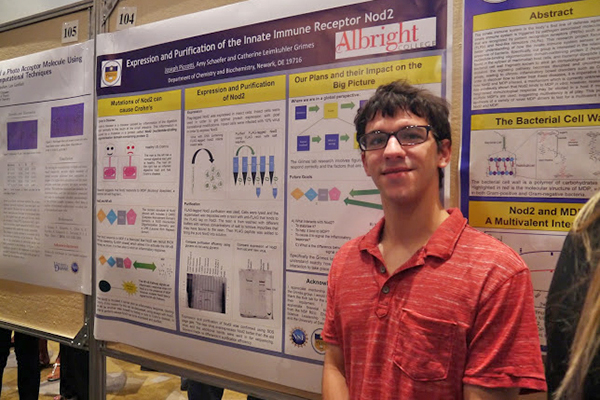


Enabling STEM
REU program promotes participation of students with disabilities in science
3:06 p.m., Aug. 25, 2014--Chemists with disabilities are working in food and drug safety, conducting chemical education research, tutoring in math and science, and teaching at colleges and universities across the country.
But Karl Booksh, professor of chemistry and biochemistry at the University of Delaware, knows that more needs to be done to prepare students with disabilities to become leaders in science, technology, engineering, and mathematics (STEM).
Campus Stories
From graduates, faculty
Doctoral hooding
That’s why he created the Chemical Sciences Leadership Initiative at UD, which brings eight to 10 undergraduates from across the country to campus to gain practical experience as research assistants working with UD professors.
The program is supported by the National Science Foundation through its REU (Research Experiences for Undergraduates) program.
Broadening participation in science and engineering
“STEM graduate students with disabilities are a significantly underrepresented minority,” says Booksh, who navigates the halls of Brown Lab in a wheelchair. “Graduate school has become a critical juncture where STEM students with disabilities disproportionately abandon educational advancement.”
By broadening participation in science and engineering, particularly among underrepresented minorities, REU projects are an effective way to address this issue at its root.
This summer at UD, eight students with disabilities ranging from autism and visual impairments to deafness and developmental disorders joined Booksh, co-principal investigator Sharon Rozovsky and six other faculty members for an eight-week intensive research and education experience in various fields of chemistry.
The program included not only science but also practical advice on dealing with disabilities, requesting accommodations, and completing grad school applications.
Josh McNeely, a junior at the University of Missouri, gained valuable experience using an array of high-tech chemical characterization equipment at UD.
“This was an amazing opportunity for me,” says McNeely, who is blind in one eye and has Type I diabetes. “Because of my experience here at Delaware, I learned a variety of experimental techniques, and I’ve been offered a research appointment in bioengineering at my home institution.”
All of the REU participants presented their work at the Undergraduate Research and Service Celebratory Symposium in Clayton Hall on Aug. 14, along with scholars from a variety of other programs at UD.
For Nicole Tucker, who came all the way to UD from Oklahoma State University with her service dog Ally, the symposium environment was challenging. Tucker, who has a form of autism, had to tune out the crowd and focus on presenting her work to interested attendees. But she welcomed the experience because she knows there will be other, similar opportunities in grad school.
“We tend to focus so much on physical and sensory disabilities that we don’t think a lot about the range of other ‘hidden’ disabilities that can affect a person’s ability to be a chemist,” says Booksh, who is currently chair of the American Chemical Society's Chemists with Disabilities group.
“Even mild disabilities can have a significant impact,” he adds. “Small hindrances can build over time to non-degree attainment. But if these students are given the opportunity and supported by role models, mentors, and physical accommodations when needed, they can succeed.”
Accentuating the positives
During the summer, Carol Stevens served as an interpreter for Sophia Hu, who attends the University of Pennsylvania and has deafness.
“People tend to look at the disability and wonder how it’s going to affect the person’s ability to function in a particular environment,” Stevens says. “But sometimes it’s actually a positive in that it prepares the person to deal with challenges.”
Providing support for students with challenges turned out to be a positive experience for the faculty and graduate student mentors as well.
“It was a great experience for me,” says Catherine Grimes, who mentored Joey Piccotti from Albright College. “I talked a lot with Joey about how science can be stressful, so helping him figure out how to deal with stress has been helpful to me in supporting other students.”
A detailed schedule reduced Piccotti’s stress levels, and journaling helped him sort out his thoughts and enabled him to stay on track.
Graduate student Joe Smith, who served as teaching assistant for the program and mentored three student research projects, found himself very invested in how all of the students’ work turned out.
“As a grad student, I’ve had the opportunity to teach classes and run labs,” he says. “But mentoring students in a program like this is different, and it taught me a lot about myself.”
“The whole progression for these students over the course of the summer is a beautiful thing to see,” he adds. “We were able to show them that research really isn’t all that scary, and in turn they brought new energy to all of us here at UD.”
Article by Diane Kukich
Photos by Matt Davenport, Chemical and Engineering News










